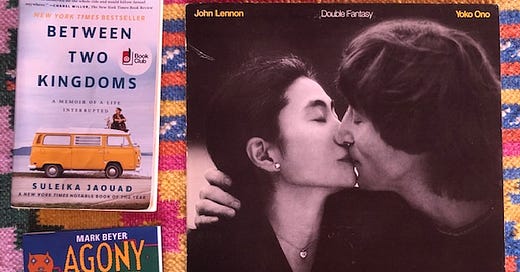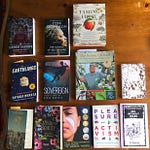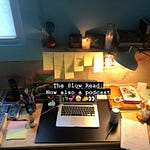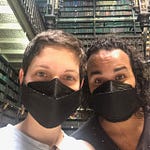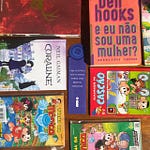Jordan and Amy can’t catch a break. Dismemberment. Abduction by demons. Exposure to chemicals that rot away flesh. Mark Beyer’s absurdist 1987 comic, Agony, in no way reflects what I have experienced this year, but the takeaway rang true for me: life is hard.
In his introduction to the 2016 edition, Colson Whitehead points out how, through it all, Jordan and Amy stay hopeful despite the fact that nothing they do has any effect on their good fortunes. “To be aware of your unending sufferings [as Amy and Jordan are] and to keep going: that’s the moral idea animating this book.” The characters start over again and again, hoping for better outcomes. They’re trying…hoping for something better.
The comic is short, something you could read in an hour or less. I took a couple of days with it, savoring the absurd escalation of maladies and the characters’ deadpan responses. In one panel, Jordan lances a head wound Amy has sustained and exclaims, “Your head is starting to get smaller but the whole apartment is filling up with blood.” On the next page, he is matter-of-fact: “We’re going to have to leave town. When our landlord sees our apartment we’re going to be in real trouble.” I was simultaneously grossed out and enthralled. Throughout, Jordan and Amy find it within themselves to start over because, what else can they do?
So here I am starting The Slow Read over after a long pause.
This project fell by the wayside for me this spring following several earth-shaking events in my personal life. My partner and I permanently moved to New York away from New Orleans, a city I called home for eleven years. The move required both celebration and grieving, but there was no time amid the packing bonanza. This was compounded by the round-trip, cross-country drive in a UHaul.
Just when the last of the boxes were unloaded and we thought everything might settle down again…dismemberment. Just kidding, but almost.
The phone rang.
“Is this Quinn?” the woman on the other end asked. She was calling to tell me about the accident.
A truck had collided with my parents car near exit 13 of the Jersey Turnpike, striking the passenger side and pinning them to the median. I wasn’t there, but I feel like I was, having since reenacted the scene for inquiring family members using sugar packets and salt shakers as cars and the breakfast table as a highway.
Both parents were hurt. Bruises, cuts, and broken bones. The woman on the phone didn’t know the extent of the injuries. None of us would know for many hours.
I got in my car and drove three hours to University Hospital. I had trouble finding my parents in the Emergency Room. They had been separated by hospital staff: my mom was sent to the acute unit, my dad was tucked away in a quiet, semi-dark corner of the Children’s wing because the ER didn’t have enough beds.
When I finally found my mom, she was screaming. So was everyone else in the acute unit. Beeping machines, each one warning us of imminent danger, went ignored. There were so many people and so few helping hands. I’ll spare you the rest of the details of the 26-hours we spent in the ER. Maybe I’ll write more about it some day. For now, the wound of this memory is still fresh and tender.
Eventually, they released my dad, but they kept my mom. She had a hangman’s fracture. The force of the truck had broken her C2-vertebra. I Googled it when I shouldn’t have.
Paralysis: possible. Death: possible.
Abduction by demons a la Agony might have been preferable.
When my mom eventually went into spinal surgery her nurse told me that there was no point waiting in the lobby.
“Go get some rest,” they said.
So, instead of doing that, I decided to go to Target. Clean underwear was needed.
There, I picked up Between Two Kingdoms: A Memoir of a Life Interrupted by Suleika Jaouad. I spent the following months struggling to get through it. Not because it was poorly executed, but because it was so painful.
The memoir covers a five-year period of Jaouad’s life. Shortly after graduating college, she is diagnosed with leukemia. Her early twenties are spent in treatment, including an invasive and risky bone marrow transplant. Jaouad’s story, like Beyer’s, does not reflect my own, and yet, something about it was deeply familiar to me, especially at a moment where my family’s life had been so severely thrown off course. None of us had any control over what would happen next. Jaouad’s story just emphasized this fact of life that so many of us love to ignore.
In the thick of my own personal crises, the writing in Between Two Kingdoms spiked my anxiety to new heights. But there was something magnetic about Jaouad’s story. Perilously, she survives her illness but continues her personal struggle even after she is deemed cancer free. The bottom of everything has fallen out. Now she must make sense of her new life. With the bottom falling out of so many aspects of my life, I thought about giving up on this book, but I found that I couldn’t.
Just ten more pages. Just another chapter. Take it in with fresh eyes this time. Start over.
I finished Between Two Kingdoms about a month after my mom came home from the hospital, nearly two months from the day of her surgery. I read it slowly. I had to. It was the only way to take it all in.
I keep having to remind myself that the world is still intact. The troubles I have laid out for you are starting to fade. My parents are well and my mom is out of her neck brace and walking. She is even driving again. At home, our boxes are finally unpacked. Our walls are painted and the floors are clean, free of dust and nails and mysterious pet hair.
We’ve started over.
Simultaneously, in the liminal space that fictional characters occupy, Amy and Jordan from Agony keep starting over and keep being thwarted.
In the real world, Suleika Jaouad’s cancer is back, she is starting her healing journey again.
Life is hard. We don’t have much say in what happens. We can start over and try to do better.
I wasn’t sure if I wanted to start this project over, but what else could I do? Reading slowly is an exercise in beginning again.
See also: Comfortable with Uncertainty by Pema Chödrön, Life, Interrupted by Suleika Jaouad, The 100 Day Project

